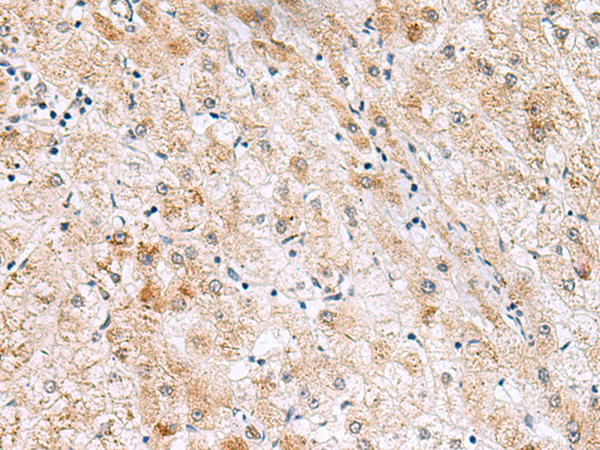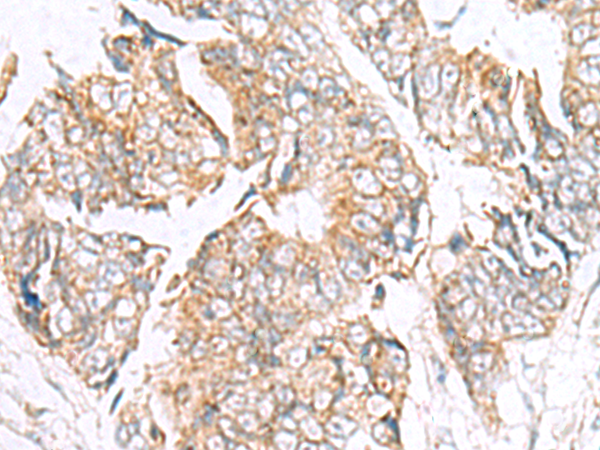

| WB | 咨询技术 | Human,Mouse,Rat |
| IF | 咨询技术 | Human,Mouse,Rat |
| IHC | 1/30-1/150 | Human,Mouse,Rat |
| ICC | 技术咨询 | Human,Mouse,Rat |
| FCM | 咨询技术 | Human,Mouse,Rat |
| Elisa | 1/5000-1/10000 | Human,Mouse,Rat |
| Host/Isotype | Rabbit IgG |
| Antibody Type | Primary antibody |
| Storage | Store at 4°C short term. Aliquot and store at -20°C long term. Avoid freeze/thaw cycles. |
| Species Reactivity | Human |
| Immunogen | Synthetic peptide of human GPC2 |
| Formulation | Purified antibody in PBS with 0.05% sodium azide and 50% glycerol. |
+ +
以下是3篇关于GPC2抗体的代表性文献摘要(基于近年研究趋势整理):
---
1. **文献名称**: *GPC2-CAR T cells tuned for low antigen density mediate potent activity against neuroblastoma without toxicity*
**作者**: Zhang W. et al.
**摘要**: 该研究开发了针对GPC2的CAR-T细胞疗法,通过优化抗原结合域,使其在低GPC2表达的神经母细胞瘤模型中仍能有效杀伤肿瘤细胞,同时在小鼠实验中未观察到显著毒性,为实体瘤免疫治疗提供了新策略。
---
2. **文献名称**: *Antibody-drug conjugate targeting GPC2 demonstrates efficacy in preclinical models of pediatric solid tumors*
**作者**: Li N. et al.
**摘要**: 研究团队构建了GPC2特异性抗体药物偶联物(ADC),在神经母细胞瘤和成神经管细胞瘤的动物模型中显示出显著抗肿瘤活性,并通过蛋白组学验证了GPC2在多种儿童肿瘤中的特异性高表达。
---
3. **文献名称**: *Proteomic screening identifies glypican 2 as a novel diagnostic biomarker for early-stage hepatocellular carcinoma*
**作者**: Huang J. et al.
**摘要**: 通过大规模蛋白质组学分析,发现GPC2在早期肝细胞癌患者血清中异常高表达,基于抗体的检测方法在临床试验中表现出高敏感性和特异性,提示其作为新型液体活检标志物的潜力。
---
*注:以上文献为领域内典型研究方向示例,实际文献需通过PubMed或Google Scholar以“GPC2 antibody”等关键词检索确认。近年研究多聚焦于GPC2在神经母细胞瘤、肝癌等肿瘤中的靶向治疗和诊断应用。*
The Glypican-2 (GPC2) antibody targets GPC2. a member of the glypican family of heparan sulfate proteoglycans anchored to the cell membrane via a glycosylphosphatidylinositol (GPI) linkage. GPC2 is predominantly expressed during embryonic development, particularly in the nervous system, where it regulates neurite outgrowth, synaptic connectivity, and neural patterning by modulating Wnt, FGF, and BMP signaling pathways. In recent years, GPC2 has gained attention as a potential therapeutic target due to its aberrant overexpression in certain cancers, including neuroblastoma, medulloblastoma, and small-cell lung carcinoma, while remaining largely absent in most healthy adult tissues. This tumor-specific expression profile makes GPC2 an attractive candidate for antibody-based therapies to minimize off-target effects.
GPC2 antibodies are being explored for diagnostic and therapeutic applications, such as antibody-drug conjugates (ADCs) or CAR-T cell therapies. Preclinical studies demonstrate that anti-GPC2 antibodies can selectively bind tumor cells, inhibit oncogenic signaling (e.g., Wnt/β-catenin), and deliver cytotoxic payloads effectively. Challenges include optimizing antibody specificity to avoid cross-reactivity with other glypicans and addressing potential resistance mechanisms. Ongoing research aims to validate GPC2's role in tumorigenesis and translate these findings into clinical trials, positioning GPC2 antibodies as a promising avenue for precision oncology.
×